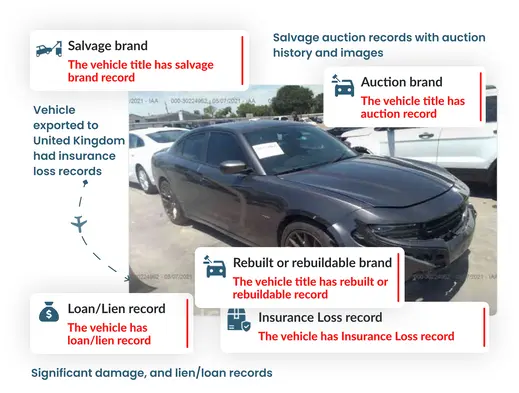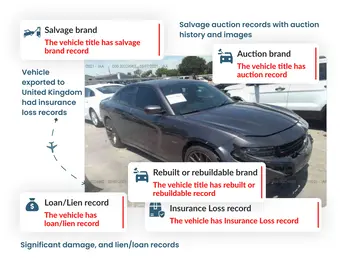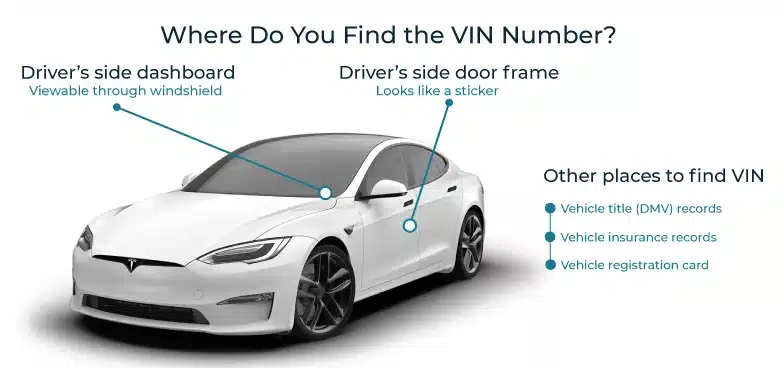VIN Check UK
With an average of 370 cars stolen per day in the UK, performing a VIN check in the UK can help show if a car is reported stolen, has any salvage or rebuilt title, has damage records, and has any hidden issues due to flooding, accident, or more.


- The vehicle had an insurance loss record.
- Accident history with salvage title record.
- Multiple service and repair records.
Why Buyers Should Get a VIN Check in the UK?
What is a VIN Check UK?
Running a VIN check is a crucial part of buying a car in the UK. It involves decoding the VIN (Vehicle Identification Number) to reveal key specifications and past records, including accident reports, mileage readings, title check status, liens, service history, and more.
Every car has a unique 17-character VIN that reveals details like the manufacturer, model, year, trim, engine, transmission, and more. Our tool also supports classic car VIN decoding, allowing you to check classic cars built before 1981 or with 5-14 VIN characters. Easily verify factory specifications and historical records to ensure you know exactly what you’re getting.
What’s Included in a VIN Check UK Report?
In the UK, more than 2,000 vehicles are written off each day, but running a UK VIN lookup can help you spot them and avoid costly mistakes. Our vehicle history report offers a wide range of details, including:
Theft Records
A VIN number check in the UK can reveal if a vehicle was stolen, including cases where U.S. cars were illegally shipped to the UK. This makes a stolen car check essential for safety and ownership verification.
Odometer Rollback Check
Mileage fraud is a frequent issue in the used car market. Our VIN number lookup detects rollbacks, helping you avoid overpaying for a high-mileage car disguised as low-mileage.
Accident Records
See any previous collisions, from minor fender-benders to severe crashes. Many imported U.S. vehicles have accident histories, so verifying structural integrity is crucial.
Damage History
Past environmental damage, such as flooding, fire, or hail, can impact performance and safety. Our VIN check UK tool flags these issues so you know before you buy.
Title Status
Learn whether a vehicle has a clean, salvage, or rebuilt title. Branded titles often indicate significant repairs, especially in imported U.S. cars.
Auction Records & Photos
Access auction history with up to 10 images, showing the car’s condition before it reached the UK market.
For the complete records provided in a vehicle history report.
A Case Study: Why You Should Check VIN Number UK?
This case study shows why it’s crucial to run a VIN number lookup in the UK. Here, a buyer found it easy to avoid a problematic 2010 Toyota Corolla by getting the VIN check report.
Sample report: 2T1BU4EE3AC509614
The Attempt to Purchase
- The car was declared “accident-free”.
- In excellent condition.
- A very attractive price.
- No title issues.
Key Findings
- 1 accident record.
- Insurance loss record.
- 1 lien/loan record.
- 8 service & repair records.
- 1 auction history with dented car images.
Outcome
- The buyer abandoned the purchase.
- He didn’t end up buying an accidented car unknowingly.
Lesson Learnt
- A clean exterior doesn’t rule out a total loss history.
- A VIN report can reveal what the buyer and seller don’t even know.
How a VIN Check UK Will Help You Avoid Bad Car Deals
According to industry reports, up to 1.4 million cars are scrapped every year in the UK, thus making a VIN check essential for used car buyers. Here’s why you need to check VIN number in the UK:
Verify Theft Status
A UK VIN check confirms whether a car has ever been reported stolen, where the theft took place, and if it was recovered. Buying a stolen vehicle not only risks losing your money but can also lead to criminal investigations. Even if you purchased it in good faith, law enforcement can seize the car at any time, leaving you without both the vehicle and your investment.
Detect Odometer Fraud
Some sellers roll back mileage to make a car appear newer and more valuable. A car mileage check shows the true mileage, protecting you from overpaying for a high-mileage vehicle disguised as low-mileage. Lower mileage can boost a car’s selling price significantly, so this scam is widespread. Knowing the real reading helps you negotiate fairly and assess the vehicle’s true wear and tear.
Check for Accident Records
The report will reveal if a vehicle was previously involved in accidents and show the severity of the damage. This insight helps you avoid vehicles with structural or safety issues that might not be visible during inspection. Some damage can lead to recurring mechanical problems, making ownership more expensive and less safe over time.
Verify Outstanding Liens
A VIN number search identifies whether there’s still an unpaid loan or financial claim tied to the vehicle. If a lien exists, the lender could legally repossess the car from you, even after purchase. The lien check ensures you get full legal ownership and aren’t hit with unexpected financial obligations later.
Identify Recalls
Certain vehicles have manufacturer recalls for safety defects or performance issues. A recall check informs you of these problems so you can arrange repairs, often free of charge at authorized dealerships. Ignoring recalls can put you and other road users at risk, so addressing them promptly is critical.
Review Ownership History
The vehicle history report shows how many owners a vehicle has had over time. A long list of owners within a short period might suggest hidden issues, poor maintenance, or dissatisfaction with the car. A stable history with fewer owners often points to better care and reliability, giving you extra peace of mind.
Instantly Look Up Classic Vehicle History in the UK
Use our classic car VIN lookup tool to find essential information on any vintage car with a 5–14 character VIN or built before 1981. Verify original specifications such as production year, manufacturer, model, engine type, transmission, and gearbox.
You’ll also get a classic vehicle history report, including accident history, title status, sales data, mileage history, auction records, and, when available, images. It’s the smartest way to understand a classic car’s true past before sitting at the negotiation table.
What our customers are saying
Great resource,very easy to navigate on the website, fill out the info they needed, and within a couple of minutes, bang ready to go. Plus, the chat is very useful for more info. My No. 1 site for such research. And the price is fair.
Larcen Noel
What an amazing service! I just received my vehicle history report from Detailed Vehicle History, and I’m thoroughly satisfied. I’ll definitely use this service again in the future
Aldrin
They did a fabulous job with GREAT customer service. Once I entered the VIN number and after only a few minutes my report was in my inbox…Read More
Brian Striemer
Additional Car Check Tools
We also provide more tools that are streamlined to help you retrieve all the vehicle information and records you need to make an informed decision, all in one place.
FAQ About VIN Check UK
How to check VIN number in the UK?
To check VIN number UK, simply use our reliable VIN number lookup UK tool. This provides insight into the ownership history, title status, lien status, accident records, theft, service history, auction records, and more.
Can I check a VIN number UK free?
Yes, you can get a VIN number check free service by using our free VIN decoder, which provides key details like year, model, engine specs, and more. For the detailed vehicle history, opt for our affordable UK VIN check service to verify accident history, title records, theft checks, odometer rollback, and more.
Can I find registration number from VIN in the UK?
Yes. You can use a VIN check service like Smart Car Check, dedicated to providing car check records in the UK. You can retrieve the reg number by entering the VIN number, your email address, and phone number. You will also get other helpful records like MOT history, outstanding finance, write-off status, logbook history, previous keepers, and more.
Run a VIN Check Before Buying a Used Car in the UK
Get your comprehensive vehicle history report now


